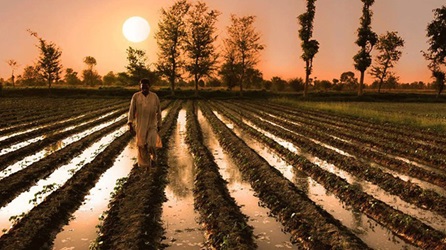ISLAMABAD: India’s unilateral suspension of the Indus Waters Treaty (IWT) could have devastating implications for Pakistan’s economy, agriculture, and exports, warned an expert, citing the country’s heavy dependence on the Indus River system for irrigation and food security.
Talking to WealthPK, Dr. Shakeel Ahmad Anjum, Director Water Management Research Centre, University of Agriculture, Faisalabad, said Pakistan’s agricultural and food security hinges on the uninterrupted flow of Indus waters.
He cautioned that any disruption could cripple crop yields and slash export revenues, particularly from water-intensive sectors such as textiles, deepening the country’s economic crisis.
“The Indus Waters Treaty, which has helped maintain regional water stability for over six decades, is now under severe strain.
Its possible breakdown poses serious water security and geopolitical challenges,” he said.
He pointed to the urgent need for water management reforms, particularly in light of India’s unilateral suspension of the Treaty, which has exacerbated Pakistan’s water scarcity.
He urged Pakistan to assert its rights through diplomatic negotiations.
Dr. Shakeel also recommended addressing water conveyance losses and increasing the nation’s water storage capacity from 30 to 60 days.
He suggested that constructing Kalabagh Dam – alongside existing storages like Mangla, Tarbela, and Chashma – could boost storage by 10 million acre-feet, significantly enhancing agricultural output.
He noted that while India and the United States can store water for 220 and 900 days respectively, Pakistan lags far behind.
He emphasized the need to capture and store more water, noting that although 10 million acre-feet flowing into the sea annually is acceptable, Pakistan is currently wasting 30-35 million acre-feet.
Under the Indus Waters Treaty, India is entitled to use 100% of water from the eastern rivers (Sutlej, Beas, and Ravi), while Pakistan has the right to 80% of the western rivers (Indus, Jhelum, and Chenab).
Dr. Shakeel clarified that although India may use water from these rivers for hydropower generation, it is not permitted to store or divert it for irrigation.
To improve water use efficiency, he called for reducing the losses from canal seepage, transpiration, evaporation, runoff, and deep percolation.
He also recommended promoting low delta (low water-requiring) crops and discouraging high water-consuming crops.
“We must evaluate how much water is being used to produce food and whether it’s sustainable,” he stressed.
Dr. Shakeel advocated better farming methods, including precision land leveling and solar-powered tubewells.
He explained that techniques like flood irrigation on ridges and bed planting can reduce water use by up to 50%.
The farmers should be educated about switching to low delta crops such as sesame, mung beans, mash, sorghum, and millet, while crops like rice and sugarcane should be grown using water-saving methods like bed sowing, he added.
He encouraged the adoption of modern irrigation technologies such as drip irrigation, subsurface irrigation, and central pivot systems.
He urged both the government and individual farmers to invest in precision agriculture to ensure long-term food and water security.
In recent years, he said, the shortage of water has already become a serious issue in Pakistan, which is affecting agriculture and food security.
Most of Punjab’s agriculture depends on canals and groundwater, but climate change and ineffective use of water resources have resulted in an insufficient water supply for the agriculture sector, he added.
Dr. Shakeel highlighted the mounting pressure on Pakistan’s food security, as its population is expected to surge from 40 million at the time of its independence in 1947 to 400 million by 2047.
He emphasized that if wheat production were 4 million tonnes in 1947, the country would need around 50 million tonnes by 2047 to meet demand.
However, despite growing needs, wheat production has stalled at approximately 30 million tonnes due to rapid industrialization, urban sprawl, water shortages, inefficient farming practices, and ineffective government policies, he said.
Discussing the overall food requirements, Dr. Shakeel said each Pakistani annually requires 124kg wheat, 17kg rice, 7kg pulses, 26kg sugar, and 22 liters of edible oil.
Citing a United Nations report, Dr. Shakeel warned that Pakistan could face severe water scarcity by 2040.
In Punjab, where most of the country’s food is produced, agricultural output could decline by as much as 30%, even if the current trends persist, he added.
The expert highlighted that water shortages also exacerbate rural poverty and unemployment.
“The farmers are unable to cultivate their lands due to the lack of water, leading to economic losses.
Moreover, a 30% drop in fodder production has disrupted the livestock sector, reducing meat and milk output, Dr. Shakeel said.
He blamed most of the crisis on India’s construction of upstream dams, which have significantly curtailed water flow to Pakistan.
He also attributed water scarcity to the rising temperatures, reduced rainfall, and decreasing snowfall in the northern regions, which are the critical sources for river water.
Climate change has decreased the rainfall by 42% and increased the temperature by 1.5 degrees centigrade in Pakistan, he said.
Groundwater depletion is another concern, he observed.
“About 50 billion cubic metres of groundwater is extracted annually in Punjab, exceeding the natural recharge rate, causing water tables to fall by up to one meter every year,” he cautioned.
He recommended regulating tube well use through a licensing system and educating the farmers on efficient water management.
“Training and policy support are vital to ensure equitable water distribution and help small farmers survive in a water-scarce future,” he added.

